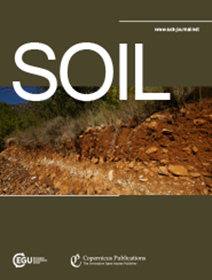Organic matters, but inorganic matters too: column examination of elevated mercury sorption on low organic matter aquifer material using concentrations and stable isotope ratios
IF 5.8
2区 农林科学
Q1 SOIL SCIENCE
引用次数: 0
Abstract
Abstract. Sorption of mercury (Hg) in soils is suggested to be predominantly associated with organic matter (OM). However, there is a growing collection of research that suggests that clay minerals and Fe/Mn oxides are also important solid phases for the sorption of soluble Hg in soil–groundwater systems. We use a series of (60 mL syringe based) column experiments to examine sorption and subsequent desorption of HgCl2 solutions (experiment 1 (EXP1): 46.1 ± 1.1 mg L−1; experiment 2 (EXP2): 144 ± 6 mg L−1) in low-OM (0.16 ± 0.02 %) solid-phase aquifer materials. Analyses of total Hg concentrations, Hg speciation (i.e. pyrolytic thermal desorption (PTD)), and Hg stable isotopes are performed on both solid- and liquid-phase samples across sorption and desorption phases of the experiments. The sorption breakthrough curve best fitted a Freundlich model. Despite the very low-OM content, the Hg equilibrium sorptive capacity in these columns is very high: 1510 ± 100 and 2320 ± 60 mg kg−1 for EXP1 and EXP2, respectively, and it is similar to those determined for high-OM soils. Data from the experiments on mass-dependent Hg stable isotope fractionation data from these experiments (described by δ202Hg) support preferential sorption of lighter isotopes to the solid-phase materials with results indicating an isotopically heavier liquid phase and an isotopically lighter solid phase. Desorption fits exponential decay models, and 46 ± 6 % and 58 ± 10 % of the sorbed Hg is removed from the solid-phase materials at the termination of desorption in EXP1 and EXP2, respectively. The divergence of δ202Hg values between liquid and solid phases also continues into desorption. This desorption profile is linked to the initial release of easily exchangeable Hg(II) species physically sorbed to Fe/Mn oxides and clay mineral surfaces (liquid phase enriched in heavy isotopes) and then slower release of Hg(II) species that have undergone secondary reaction to more stable/less-soluble Hg(II) species and/or diffusion/transport into the mineral matrices (processes favouring lighter isotopes; solid phase enriched in lighter isotopes). The secondary production of Hg(0) within the columns is confirmed by PTD analyses that indicate distinct Hg(0) release peaks in solid-phase samples at <175 ∘C, which again agrees with field observations. Retardation (RD) and distribution (KD) coefficients are 77.9 ± 5.5 and 26.1 ± 3.0 mL g−1 in EXP1, respectively, and 38.4 ± 2.7 and 12.4 ± 0.6 mL g−1 in EXP2, respectively. These values are similar to values derived from column experiments on high-OM soil and provide the basis for future Hg fate and transport modelling in soil–groundwater systems.有机物,但也有无机物:利用浓度和稳定同位素比对低有机物含水层材料上的高浓度汞吸附进行柱状检测
摘要土壤中汞(Hg)的吸附被认为主要与有机物(OM)有关。然而,越来越多的研究表明,粘土矿物和铁/锰氧化物也是土壤-地下水系统中吸附可溶性汞的重要固相。我们使用一系列(60 毫升注射器式)柱实验来研究 HgCl2 溶液的吸附和随后的解吸(实验 1 (EXP1)):46.1 ± 1.1 毫克/升;实验 2 (EXP2):144 ± 6 mg L-1)。在实验的吸附和解吸阶段,对固相和液相样品进行了总汞浓度、汞标样(即热解热脱附(PTD))和汞稳定同位素分析。吸附突破曲线与 Freundlich 模型最为吻合。尽管有机质含量很低,但这些柱子的汞平衡吸附容量非常高:EXP1 和 EXP2 分别为 1510 ± 100 和 2320 ± 60 mg kg-1,与高有机质土壤的吸附容量相近。质量依赖性汞稳定同位素分馏实验的数据(用 δ202Hg 描述)支持较轻同位素优先吸附到固相材料上,结果表明液相的同位素较重,固相的同位素较轻。解吸附符合指数衰减模型,在 EXP1 和 EXP2 中,解吸附结束时分别有 46 ± 6 % 和 58 ± 10 % 的吸附汞从固相材料中去除。液相和固相之间的 δ202Hg 值差异在解吸过程中也会继续存在。这种解吸附过程与最初释放的易交换的 Hg(II)物种(物理吸附在铁/锰氧化物和粘土矿物表面)有关(液相富含重同位素),然后释放的 Hg(II)物种经过二次反应变成更稳定/更难溶解的 Hg(II)物种和/或扩散/迁移到矿物基质中(有利于轻同位素的过程;固相富含轻同位素)。柱内二次生成的 Hg(0)得到了 PTD 分析的证实,PTD 分析表明固相样品在 <175 ∘C 时有明显的 Hg(0)释放峰,这与实地观测结果再次吻合。在 EXP1 中,缓释系数(RD)和分布系数(KD)分别为 77.9 ± 5.5 和 26.1 ± 3.0 mL g-1;在 EXP2 中,分别为 38.4 ± 2.7 和 12.4 ± 0.6 mL g-1。这些数值与高有机质土壤的柱状实验得出的数值相似,为今后建立土壤-地下水系统中汞的归宿和迁移模型提供了依据。
本文章由计算机程序翻译,如有差异,请以英文原文为准。
求助全文
约1分钟内获得全文
求助全文
来源期刊

Soil
Agricultural and Biological Sciences-Soil Science
CiteScore
10.80
自引率
2.90%
发文量
44
审稿时长
30 weeks
期刊介绍:
SOIL is an international scientific journal dedicated to the publication and discussion of high-quality research in the field of soil system sciences.
SOIL is at the interface between the atmosphere, lithosphere, hydrosphere, and biosphere. SOIL publishes scientific research that contributes to understanding the soil system and its interaction with humans and the entire Earth system. The scope of the journal includes all topics that fall within the study of soil science as a discipline, with an emphasis on studies that integrate soil science with other sciences (hydrology, agronomy, socio-economics, health sciences, atmospheric sciences, etc.).
 求助内容:
求助内容: 应助结果提醒方式:
应助结果提醒方式:


